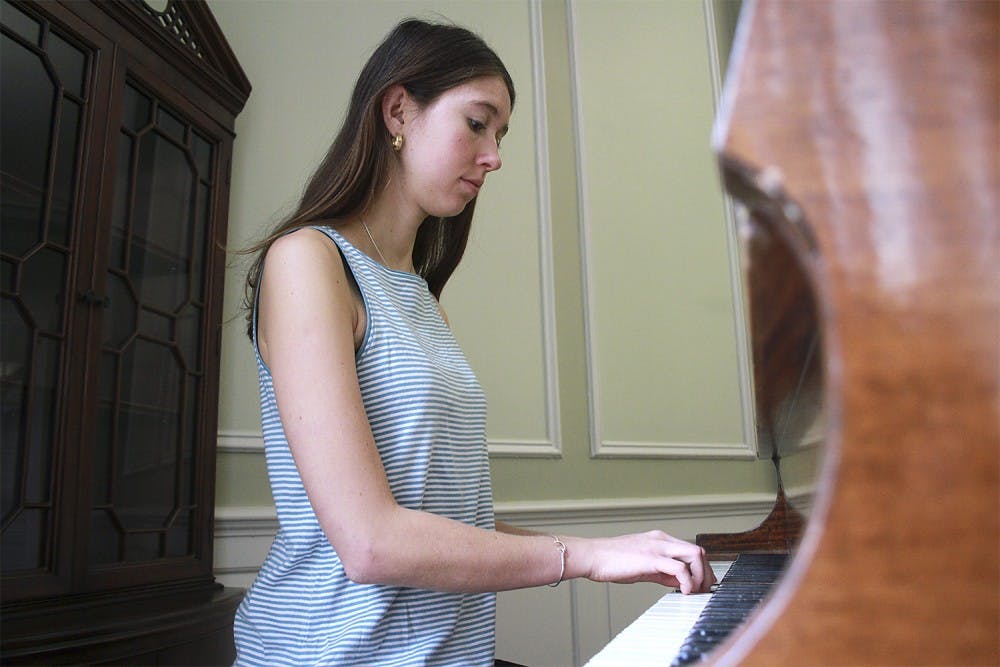“I do think it is (an asset) because the (piano) practice rooms are in Hill Hall, so it’s a good 20-minute walk from South Campus,” she said. “So if it’s really rainy or I’m cramped for time, it is nice to practice a little here.”
According to Rick Bradley, associate director of the Department of Housing and Residential Education, 11 out of the 32 residence halls around campus contain pianos: Alderman, McIver, Spencer, Morrison, Hinton James, Craige, Ehringhaus, Parker, Cobb, Ruffin and one in the Odum Village Apartments.
“With the exception of (the one in) Spencer, which was purchased from the Wesley Foundation in 2013, all of these pianos have been at these locations at least 15-plus years,” Bradley said.
Bradley notes that in buildings like Cobb where the pianos are in big, open lobby areas, students are more apt to sit and listen to their peers perform piano pieces. In buildings with pianos located in more private rooms, however, it is more of an individual practice space.
In dorms that don’t have lobbies — like Ruffin — pianos are located in converted lounge spaces.
“It’s not really conducive to having lots of people around,” Bradley said. “If somebody is playing in the lounge, then probably others don’t tend to go there.”
As an avid piano player, Armstrong-Carter agreed.
“The public location makes it a little bit difficult because people are often studying in here, but a lot of other people come and play it too.”
Freshman Carley McAlarney is a music minor who doesn’t share the luxury of a piano in her dorm, Hardin. She says because her dorm doesn’t have a piano, she either plays on a keyboard in her room or has to walk to Hinton James to play, but she would much rather have a real piano in her own residence hall.
“It could be something to bring the community together,” she said. “I think it’s useful. And it could be fun, too.”
Bradley said most of the pianos were either purchased by the Residence Hall Association or donated by churches, the music program or former residents within the dorms, among others.
While the RHA is in charge of procuring the pianos, the housing department is responsible for professionally maintaining the instruments and keeping them in good playing condition for residents.
To get the day's news and headlines in your inbox each morning, sign up for our email newsletters.
“We maintain (the pianos) in terms of tuning them manually,” Bradley said. “We pay for contractors or vendors to come and tune those for us as needed.”
Armstrong-Carter noted that the piano in her dorm is very old. She said there is no brand name on the piano, which is often a sign of an older model. She even demonstrated the age of the piano by attempting to play one of her favorite classical pieces. During the piece, she pointed out that some keys were either out of tune or were unable to be played at all.
“It’s not very well-maintained, to be honest,” Armstrong-Carter said. “It’s better than nothing, but you can look at the keys. A lot of them are out of tune, and a lot of them are dysfunctional.”
She further explained the condition of the instruments, saying she wished they were in better condition.
“They maintain them in the sense that they’re not tearing apart, but they’re not being regularly tuned,” Armstrong-Carter continued. “Pianos are supposed to be tuned every six months.”
Clara Yang, assistant professor of piano at UNC, agreed. She said because pianos are instruments frequently played by a lot of different people, they must be regularly tuned and regularly worked on in order to maintain the quality they have when first built.
“They get used to varying levels,” Bradley countered. “Some of the buildings were aware of them, and they get used very often, and some other buildings it’s rare that they seem to be used. Certainly (in) the buildings where they get used a lot people seem to enjoy them, and it seems to be sometimes a focal point. Students kind of hang around and listen to somebody play.”
Yang believes it’s important for students both experienced in piano and interested in learning the instrument to have access to a piano within their dorms.
“(Having the instrument in the dorms) encourages curiosity in piano,” she said. “It will only enrich your life.”
Although McAlarney, Armstrong-Carter and Knudsen agree the pianos are very important to enriching the dorm environment, all of them believe every dorm would benefit by having a better-maintained or improved quality of piano in their living space.
“It’s such an asset to the community,” Armstrong-Carter said. “It would be nice to have it a little bit better taken care of.”
arts@dailytarheel.com




